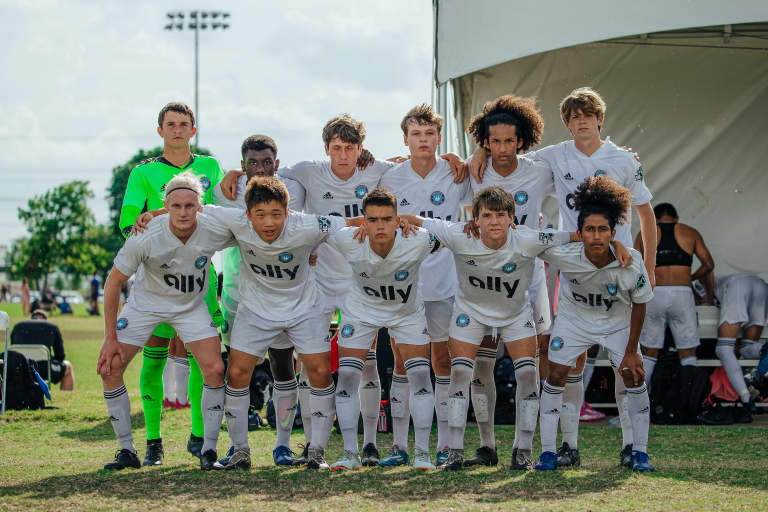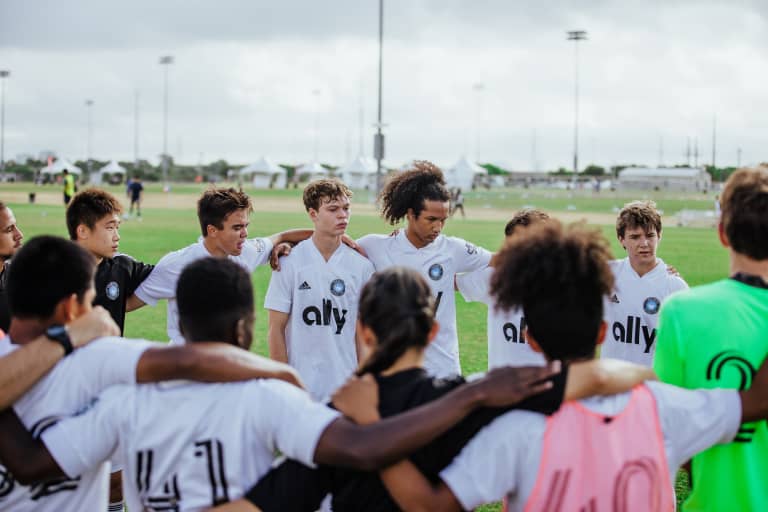The latest edition of MLS 101 focuses on the benefits of youth development programs in soccer
What is an Academy?
A soccer club’s academy is its youth investment program. It aims to develop young players, with a view to placing them on the first-team roster if they show enough potential.
A player who graduates through an MLS Academy and earns a first-team contract is known as a Homegrown player.
“The academy is the lifeblood of any successful club,” says Charlotte FC Technical Director Marc Nicholls. “It is the link that binds everything together, including the wider community and the wider sense of club.”
What is a Homegrown Player?
A Homegrown player is a player who has spent at least one year in a club’s academy, and who has lived in the club’s territory. Charlotte FC’s territory—the region from which the club has the rights to source its youth players—is the entirety of North and South Carolina.
Homegrown players are academy graduates who are given first-team contracts. There is no limit to the number of Homegrown Players that a club may sign to its first-team roster in any given year.

Why do MLS teams invest in Academy programs?
The best clubs in world soccer tend to have the best academy programs. And the countries whose teams invest in youth development tend to field strong national teams. Hence, MLS Academies are vital to the growth of the league, and in turn, the growth of the national team program.
For an MLS team, Academy players are the cheapest way to fill roster spots, as no transfer fees or trades are required to sign them. To use a food analogy, it is cheaper, and often better, to grow your own vegetables than buy them in the store.
The league has also placed incentives for teams to field Homegrown players: MLS clubs benefit from a subsidy taken from the Targeted Allocation Money (TAM) pool when signing Homegrown Players to their first contract. This means teams have a greater proportion of their salary budget to spend in other areas.
Additionally, the 29th and 30th spots on a 30-man MLS roster are reserved exclusively for Homegrown players, so their inclusion allows MLS teams to utilize the maximum available roster size. Thus far, Charlotte have signed three Academy players to Homegrown deals: Brian Romero, Nimfasha Berchimas, and Jack Neeley.
Producing players who can later be sold at a profit also provides a sustainable business model for clubs. But the benefits of youth development are not only financial, as local players are frequently favored by club fanbases. For example, in his sophomore season with the Sounders, Seattle native Jordan Morris sold more shirts than United States Men’s National Team star Clint Dempsey.
How are MLS Academies structured and how do they train?
MLS Academies consist of full-time teams separated by age group. In 2023-24, Charlotte FC will field U-14, U-15, U-17, and U-20 teams. There is also a part-time program for U12 and U13 age groups, known as the Discovery Program.
MLS Academies play a European-style fall-through-spring schedule, which coincides with the academic school year. The 2021-22 season is Charlotte FC’s second Academy season.
Players train four times a week and represent the club at weekends in competitive matches in the MLS Next league. MLS Next features Academy sides from MLS teams and other top youth programs from the United States and Canada.
Academy teams can also earn the right to participate in the prestigious, annual tournament MLS Generation Adidas Cup through qualification tournaments. This elite competition features youth teams from MLS, Europe and South America.
Find out more about Charlotte FC’s Academy programming here.

Where does Charlotte FC source its Academy players?
Charlotte FC has the rights to sign youth players from its aforementioned territory of North and South Carolina. Current Academy players have signed from local programs including Charlotte Soccer Academy, Charlotte Independence and Queen City Mutiny.
Charlotte FC has also sourced players from programs based throughout the Carolinas, like NC Fusion in Winston-Salem, CESA in Greenville, SC United in Columbia, North Carolina FC Youth in Raleigh and South Carolina Surf S.C. in Mount Pleasant, S.C.
The Discovery Program, meanwhile, is fundamental in developing relationships with all local clubs, and identifying and developing local players.
Academy players whose families are based outside the Charlotte metro area participate in the Homestay Program, where they are hosted by local families.
For more information on the Homestay Program, and the opportunity it presents to help enrich a young athlete, click here.













